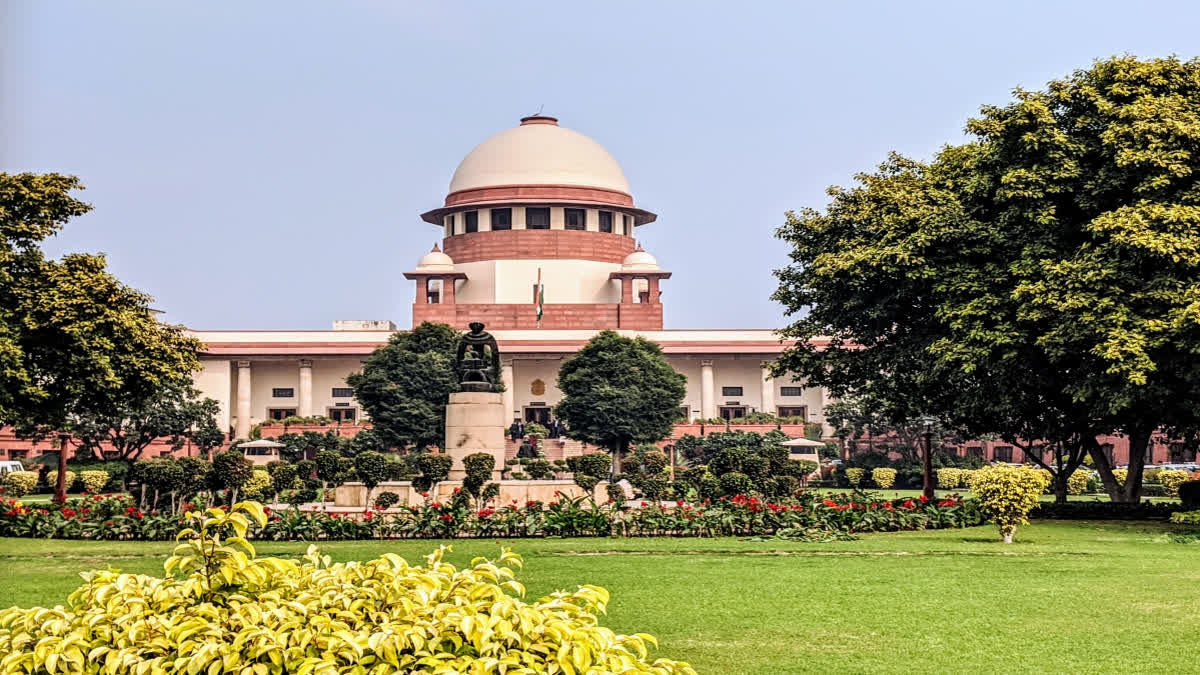New Delhi: As political parties slug out on the idea of redistribution of wealth to community, the Supreme Court on Tuesday said that, in today's times, Article 39 (b) and (c) of the Constitution, cannot be attributed a definition, which gives unbridled agenda of communism or socialism, as it is not our Constitution today.
The apex court emphasised that the interpretation of the Constitution must be nuanced to take care of what India is today and what India is moving towards tomorrow.
Article 39(b) in the Directive Principles of State Policy says that "the State shall, in particular, direct its policy towards securing that the ownership and control of the material resources of the community are so distributed as best to subserve the common good". Article 39(c) states that "the operation of the economic system does not result in the concentration of wealth and means of production to the common detriment".
Solicitor General Tushar Mehta, representing the Maharashtra government, before a nine-judge bench headed by Chief Justice of India D Y Chandrachud referred to the width of Article 39 and added that the question in which he is assisting the court is whether a private property would fall under Article 39? He elaborated on his perception of Article 39.
"The ownership and control of material of the community are so distributed best to subserve the common good. Each word in my submission is pregnant with making of a welfare state….ownership and control necessarily mean that something which do not belong to the government but in the larger interest of the common good there can be a law passed…," submitted Mehta, adding that he proposing to dissect the words in Article 39 (b).
The bench, also comprising Justices Hrishikesh Roy, B V Nagarathna, Sudhanshu Dhulia, J B Pardiwala, Manoj Misra, Rajesh Bindal, Satish Chandra Sharma and Augustine George Masih, is answering a reference whether the phrase "material resources of the community" in Article 39(b) of the Constitution includes what is privately owned.
Justice Nagarathna said "the question is whether the ownership of the community is also equivalent to ownership of an individual, or the ownership of the community also encompasses individual ownership of the property? Whether a community means an individual?"
Mehta said for example in my house a rare mineral has been discovered, it is not the property of the community rather the property of an individual then the keyword would be material resources. He added that if individual property has material resources, which can be distributed for the common good of the citizens.
The CJI told Mehta, "Your example is apposite. Your example shows that there will be instances where in respect of private property there is a community interest. This is clearly a case of that nature…..you say Uranium or any rare resource, which is a resource of the community therefore cannot be a strict dichotomy between private and public".
In Ranganatha Reddy case (1978), a five-judge of the apex court, by 4-1 majority, had clarified that privately-owned resources did not come under material resources of the community under Article 3 (b). However, Justice Krishna Iyer said in his dissenting opinion that it would include private property.
Today, the CJI further added that at the same time, the formulation by Justice Krishna Iyer is a little too extreme. "What that formulation says is that since the community consists of individuals therefore every individual is part of the community. Material resources of the community would also mean resources of the individual. That may be a little extreme….", said the CJI. Mehta agreed with the CJI.
The CJI said, it is important to be cognizant of the fact that all these constitutional provisions have an evolution and "we are not interpreting them in India of 1950s". Mehta said it is from nationalisation to disinvestment, that is the transition.
"We must therefore adopt an interpretation which is in keeping with the changing nature of times and the society. We must have an enduring interpretation….certain resources which are vested in private individuals may still have general bearing of public interest or community welfare, which requires regulation by the state," observed the bench.
Mehta said for example making of a road, land is a material resource and it is for common distribution, and land may not belong to the entire community but belong to an individual.
CJI said Article 39(b) postulates that there should be diversity of ownership and control, why does it say ownership and control of the material resources of the community is distributed.
"This is speaking about the need for diversification of ownership and control to protect the common good. You don't have a concentration of economic resources in the hands of (few)….," he said.
Mehta said the rustic way of looking at this is that you total up the wealth of the entire nation, divided by the people amongst one thinks it should be distributed and whatever is the figure you distribute it. That is not Article 39 means, that would be lack of understanding of governance and economics, added Mehta.
The CJI said: "you cannot attribute to Article 39 (b) and (c) in today's times a sort of definition which gives an unbridled agenda of communism or socialism, that is not our Constitution today. We still protect private property, protect the right to carry on business…..".
"We have expressly adopted a policy of encouraging investment by the private sector….but now to have truly a productive enterprise, you need to encourage private investment. Therefore, our interpretation must be nuanced to take care of what India is today and what India is moving towards tomorrow", said the CJI.
Mehta said investment in the private sector is now boosting common good then what was envisaged in 1949. "In 1950, nobody would have envisaged that you would have electricity distribution by private companies….they could not have envisaged that the private sector would build up infrastructure like roads, ports…," said the CJI.
Mehta said at airports, some of the activities are privatised. "We may not have a strict dichotomy that something which is totally privately owned can never be a material resource of the community that will be extreme statement, but it will be equally extreme statement to postulate that everything which is private is a material resource of the community, which the Attorney General argued," said the CJI.
Last week, the AG, appearing for the Maharashtra Housing And Area Development Authority (MHADA), had submitted before the court that all things which are available in the material world and made available by human interaction constitute the resource of the community, which includes a car, corporation producing cars, semiconductor chip, and mobile phones.
Justice Dhulia told Mehta that his argument is going contrary to the AG's submissions. Mehta said I will not argue contrary to him but my submission is more nuanced and my nuance is different.
"The view expressed by Justice Krishan Iyer deserves respect but with respect I would personally and on behalf of the government would not subscribe to that view at this stage of the country's economic development," said Mehta.
The CJI said; "we are sending a message, what is India is and what India aspires to be, we do not want to dilute the significance of Article 39 (b) and (c) and at the time we should not be sending message by interpreting 39 (b) in such a wide sense that there is no protection of private rights in the society at all. How will it attract private investment…we will not go as far as to say that anything which is private can never be a material resource of the community…".
The hearing in the matter will continue tomorrow. The reference to the nine judges had arisen in the context of the two views emerging in the Ranganatha Reddy case.


